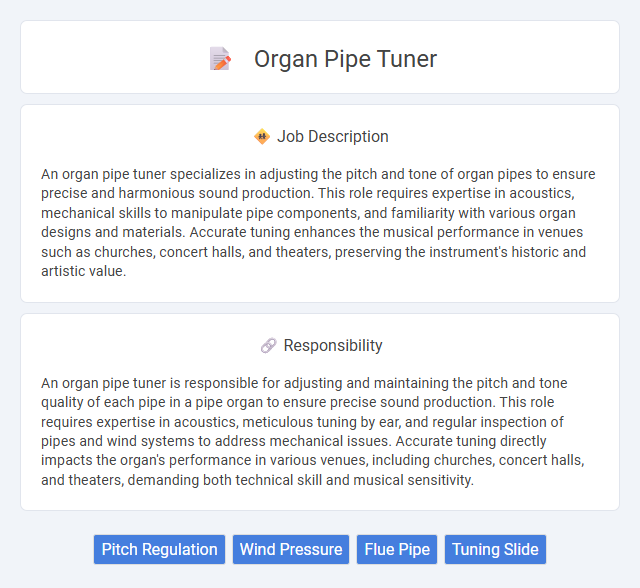
An organ pipe tuner specializes in adjusting the pitch and tone of organ pipes to ensure precise and harmonious sound production. This role requires expertise in acoustics, mechanical skills to manipulate pipe components, and familiarity with various organ designs and materials. Accurate tuning enhances the musical performance in venues such as churches, concert halls, and theaters, preserving the instrument's historic and artistic value.
People with strong auditory skills and a keen sense of pitch are likely suitable for the organ pipe tuner job, as precise tuning requires acute listening abilities. Those with patience and attention to detail may have a higher probability of success in this role, given the meticulous nature of the work. Candidates prone to frustration or lacking manual dexterity might find this job challenging and possibly unsuitable.
Qualification
Organ pipe tuner jobs require specialized skills in acoustics, mechanical repairs, and electrical systems related to pipe organs. Candidates must demonstrate proficiency in music theory, especially in pitch and sound harmonics, alongside experience in precise tuning techniques to ensure optimal sound quality. Technical qualifications often include formal training or certification in organ technology, coupled with hands-on experience working with various pipe organ models.
Responsibility
An organ pipe tuner is responsible for adjusting and maintaining the pitch and tone quality of each pipe in a pipe organ to ensure precise sound production. This role requires expertise in acoustics, meticulous tuning by ear, and regular inspection of pipes and wind systems to address mechanical issues. Accurate tuning directly impacts the organ's performance in various venues, including churches, concert halls, and theaters, demanding both technical skill and musical sensitivity.
Benefit
Working as an organ pipe tuner likely offers the benefit of developing specialized skills in precision acoustics and mechanical adjustment. There is a probability of gaining satisfaction from preserving historical and musical heritage through meticulous tuning. The role may also present opportunities for steady work in churches, concert halls, and historic venues with a niche demand for expertise.
Challenge
The role of an organ pipe tuner probably demands a high level of precision and patience due to the intricate nature of tuning hundreds of pipes to achieve perfect harmony. Encountering varying pipe materials and environmental factors likely complicates the tuning process, requiring adaptive problem-solving skills. The challenge often lies in maintaining historical accuracy while incorporating modern techniques to ensure optimal sound quality.
Career Advancement
Mastering the complex mechanics of organ pipe tuners offers specialized career opportunities within the musical instrument maintenance industry, with a focus on pipe organs used in concert halls, churches, and theaters. Skilled tuners can advance to roles like lead technician, restoration specialist, or acoustic consultant, often commanding higher salaries and project leadership responsibilities. Continuous education in acoustic science and historic instrument conservation greatly enhances career prospects and job stability in this niche field.
Key Terms
Pitch Regulation
An organ pipe tuner specializes in adjusting the pitch of each pipe to achieve precise tonal accuracy, ensuring harmonious sound production across the instrument. This process involves meticulous measurement of frequency and fine-tuning of pipe lengths or slit adjustments to maintain consistent pitch alignment. Mastery in acoustics and familiarity with various pipe materials enhance the tuner's ability to regulate pitch effectively for diverse organ designs.
Wind Pressure
An organ pipe tuner must precisely adjust the wind pressure to ensure accurate pitch and tonal quality of each pipe. Maintaining consistent wind pressure is critical, as fluctuations can cause pitch instability and affect the harmonic balance of the organ. Advanced knowledge of wind supply systems and pressure regulation instruments enables tuners to achieve optimal sound performance in various acoustic environments.
Flue Pipe
An organ pipe tuner specializing in flue pipes expertly adjusts wind pressure and pipe length to achieve precise pitch and tonal clarity, ensuring each pipe produces a harmonious sound within the organ's ensemble. Mastery of reed and flue pipe voicing techniques enhances the instrument's overall timbre and dynamic response, crucial for maintaining historical and modern pipe organs. Expertise in identifying issues like air leakage and pipe damage helps preserve the integrity and performance of flue pipes in diverse environmental conditions.
Tuning Slide
An organ pipe tuner's primary responsibility involves precise adjustment of the tuning slide to regulate pitch and ensure harmonious sound production. The tuning slide alters the effective length of the pipe, directly impacting the frequency and tonal accuracy of each note. Mastery in handling this component allows the tuner to maintain optimal sound quality across the entire organ.
 kuljobs.com
kuljobs.com